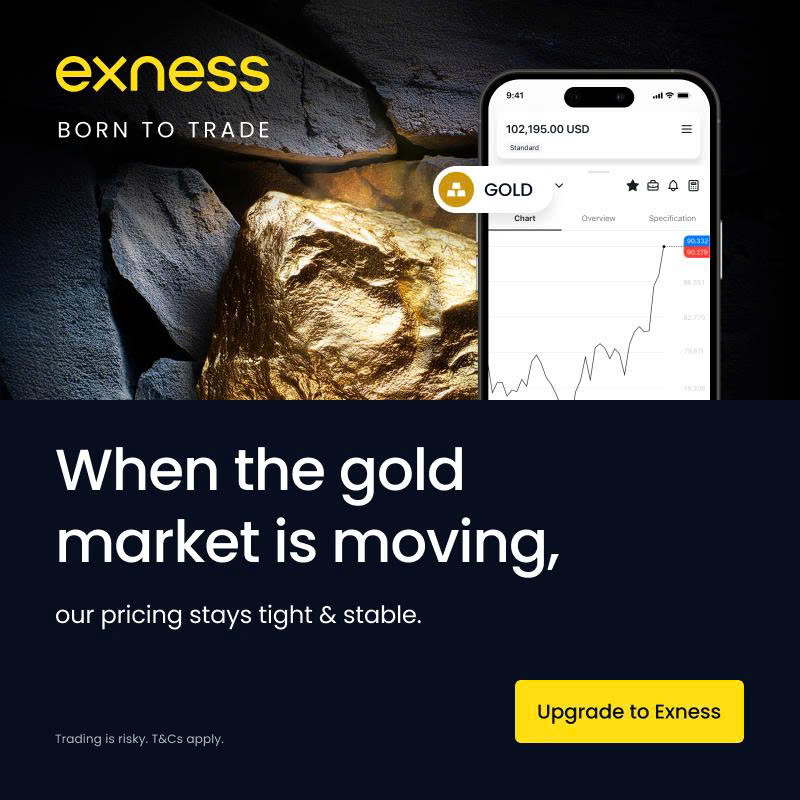
7 minute read
How to Start Forex Trading in Singapore: A Complete Guide
from Exness
by Exness Blog
If you're living in Singapore and wondering how to get started with forex trading, the good news is that you're in one of Asia’s most well-regulated and financially developed countries. Forex trading is legal, accessible, and regulated by the Monetary Authority of Singapore (MAS), giving you a safe environment to trade. But how exactly do you begin?
Top 4 Best Forex Brokers in Singapore
1️⃣ Exness: Open An Account or Visit Brokers 🏆
2️⃣ XM: Open An Account or Visit Brokers 💥
3️⃣ JustMarkets: Open An Account or Visit Brokers ✅
4️⃣ Quotex: Open An Account or Visit Brokers 🌐
Let’s break it down clearly — no fluff, no confusion. This article gives you everything you need to know to start forex trading in Singapore today.
1. Understand What Forex Trading Really Is
Forex (foreign exchange) trading is the act of buying and selling currencies. The goal is to profit from fluctuations in exchange rates. For example, you might buy EUR/USD if you believe the Euro will strengthen against the US Dollar.
Forex is traded in pairs and the market is open 24 hours a day, five days a week. It’s the largest and most liquid market in the world, with over $6 trillion traded daily.
In Singapore, retail investors can access the forex market via online brokers, usually using platforms like MetaTrader 4 (MT4), MetaTrader 5 (MT5), or proprietary web-based platforms.
2. Check the Legal Status: Is Forex Trading Legal in Singapore?
Yes, forex trading is 100% legal in Singapore. However, only brokers that are regulated by the Monetary Authority of Singapore (MAS) are allowed to operate locally. MAS is known globally for its strict regulatory standards.
Before you trade, always make sure your broker is MAS-regulated. Look for the Capital Markets Services (CMS) license.
If you're using an international broker not based in Singapore, ensure they are regulated by other respected financial authorities like the FCA (UK), ASIC (Australia), or CySEC (Europe). Still, MAS-regulated brokers are the safest option if you live in Singapore.
3. Choose a Reliable Forex Broker
Choosing the right broker is the first major step to trading forex. In Singapore, many reputable brokers are available, including both local and global names.
Here’s what to consider when choosing a broker:
Regulation: Preferably regulated by MAS.
Trading platforms: MT4, MT5, cTrader, or web-based platforms.
Spreads and fees: Look for low spreads and zero commission (or fair commission models).
Leverage: In Singapore, regulated brokers may offer leverage up to 1:50 for retail clients.
Deposit/Withdrawal methods: Bank transfer, PayNow, credit cards, or e-wallets like Skrill and Neteller.
Customer service: 24/5 or 24/7 support is important, ideally with a Singapore-based help desk.
Examples of well-known forex brokers operating in Singapore include IG Markets, CMC Markets, Saxo Markets, and OANDA. Some international brokers like Exness and Pepperstone also serve Singaporean traders, but always double-check their regulatory status.
4. Open a Live Forex Trading Account
Once you’ve picked your broker, the next step is opening your account. This process is similar to opening a bank account, but it’s online and typically faster.
Here’s what you’ll need:
A valid Singapore NRIC or passport
Proof of address (utility bill or bank statement)
Email address and phone number
Completed KYC (Know Your Customer) verification
Once your identity is verified, you’ll be able to access your broker’s trading platform and start using a demo account or deposit funds to begin live trading.

✅ Trade with Exness now: Open An Account or Visit Brokers 👈
5. Start With a Demo Account First
Before you put your real money at risk, it’s smart to practice with a demo account. This is a simulated trading environment with real-time data where you can:
Learn how the platform works
Test your strategies risk-free
Understand how spreads, margin, and leverage affect your account
Most brokers offer free demo accounts with virtual balances between $10,000 and $100,000. Spend at least a few weeks here before switching to real money.
6. Fund Your Account
To trade live, you need to deposit real money. Most brokers accept:
Bank transfers (FAST/GIRO)
Credit/debit cards
PayNow
E-wallets (Skrill, Neteller)
Minimum deposits vary. Some brokers let you start with as little as SGD 10, while others require SGD 500 or more. Start small — especially if you’re a beginner.
Be mindful of:
Deposit fees
Withdrawal times
Currency conversion fees (if funding in SGD for USD-based accounts)
7. Choose the Right Trading Platform
Most traders in Singapore use:
MetaTrader 4 (MT4): Great for beginners and widely supported.
MetaTrader 5 (MT5): Offers more instruments and features.
Web-based platforms: Offered by brokers like IG or Saxo with no downloads.
Mobile apps: For on-the-go trading.
Your broker will usually provide free access to one or more of these platforms. Make sure the platform suits your trading style and offers essential tools like technical indicators, risk management settings, and real-time news.
8. Learn Basic Forex Concepts Before Trading
Forex isn’t gambling. You need a foundation of knowledge to avoid common beginner mistakes. Key concepts to understand include:
Pip: The smallest price movement in a currency pair.
Leverage: Allows you to control a large position with a small amount of money.
Margin: The amount you must have in your account to open a trade.
Lot size: The volume of your trade (standard, mini, or micro lots).
Spread: The difference between the bid and ask price.
Stop loss & take profit: Tools to control risk and lock in profit.
Fortunately, there are many online courses, YouTube channels, and broker-provided education specifically for beginners.
9. Develop a Simple Trading Strategy
You don’t need to be a professional trader to make profits. Start with a basic strategy based on technical analysis or price action.
Examples:
Support and resistance trading
Breakout trading
Trend-following with moving averages
Scalping or day trading on low timeframes
Avoid copying strategies blindly. Always backtest and forward-test your strategy on demo before going live. Use risk management rules such as:
Risk only 1-2% of your capital per trade
Set a fixed stop-loss
Don’t overtrade
10. Be Aware of Taxes and Legal Reporting
In Singapore, profits from forex trading are generally not taxed if done as a personal investment. However, if you trade professionally (i.e., full-time or for clients), you may be subject to income tax.
There is no capital gains tax in Singapore. Still, it’s wise to keep clear records of your deposits, withdrawals, and trade history. If you're unsure, consult a tax advisor for compliance.
11. Stay Updated With Economic News
The forex market is highly sensitive to global news. You’ll need to follow:
Interest rate decisions
Inflation reports
Employment data (like US Non-Farm Payrolls)
Geopolitical events
Use economic calendars (available on most broker platforms) and news sources like Bloomberg, Reuters, or TradingView.
Even if you’re a technical trader, news can affect price action — so never trade blind.
12. Start Small and Scale Up Slowly
The biggest mistake beginners make is over-leveraging or trying to get rich quickly. In reality, forex trading is a skill that takes time and practice.
Start with small positions. Even if you only make a few dollars per trade in the beginning, the important thing is to:
Learn how to manage risk
Develop emotional control
Build discipline and consistency
With time, you can scale up your account and strategy safely.
Final Thoughts: Is Forex Trading Worth It in Singapore?
Absolutely — if you treat it like a business and invest in your education. Singapore offers a great environment for retail forex traders thanks to its regulation, financial infrastructure, and access to global markets.
However, success in forex trading doesn’t come overnight. Take your time, study the market, and trade with a clear plan. Use demo accounts, keep learning, and don’t risk what you can’t afford to lose.
Forex trading in Singapore can be profitable, rewarding, and even life-changing — but only for those who are prepared, disciplined, and patient.
✅ Trade with Exness now: Open An Account or Visit Brokers 👈
Read more:

